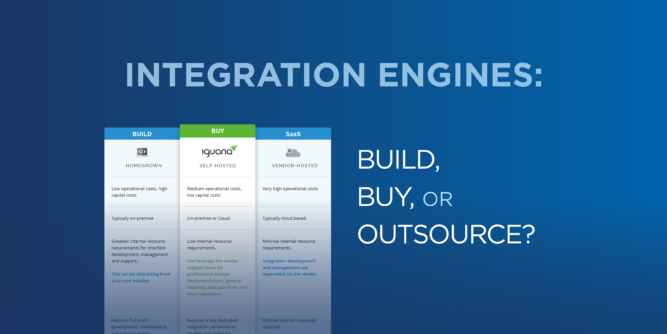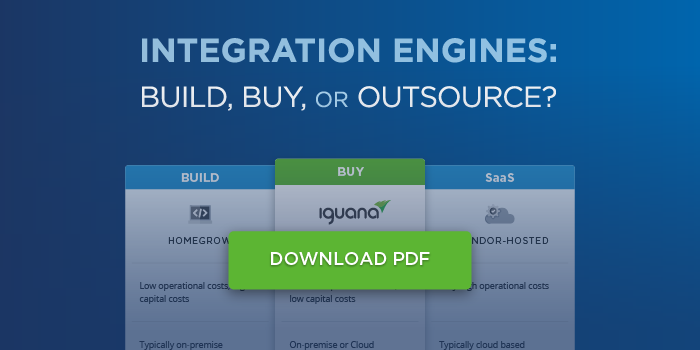
With the emergence of new technologies, healthcare organizations are faced with unique data integration challenges in an effort to maintain competitive advantage.
Whether you are looking to create a simple HL7 integration with your EHR or exchange more complex data formats, most organizations will eventually find themselves at an inevitable crossroad. Do you build, buy or outsource your integration engine?
The answer depends on a number of factors that affect Total Cost of Ownership (TCO). Let’s explore each scenario.
Option A: Build your own integration engine
Potential indicators that you should build your own integrations include:
- Complete control over your solution is a must-have.
- You have dedicated internal resources and a development team to build and maintain your solution.
- Your use-case is very specific and narrow, meaning that a solution that fits your needs may not be available on the market.
- You have an understanding of the complex structuring of data and you have the capability to manage future versions and ongoing changes.
Option B: Buy an integration engine that your organization can host, implement, and support
Here are some indicators that you should buy your integration platform:
- You have some dedicated internal resources to develop and maintain integrations.
- You already have the infrastructure or require the flexibility to deploy in multiple environments.
- You require real-time data processing.
- You have a tight timeline to develop and deploy a solution and require the ability to scale quickly.
- You have security requirements in which it can be difficult for home-grown solutions to comply with.
Option C: Outsource your integrations through a vendor-hosted SaaS integration platform.
Below you will find common indicators that you should outsource your integration:
- Your project does not have budget constraints and you can afford to sustain the ongoing maintenance costs.
- You do not have an in-house software development team to build and maintain your integrations.
- You have a broad/general use case for which a custom solution is not required.
- You want to relieve your organization from handling the complexities of building software in house.
Through an analysis and deep dive SaaS trends, SaaS companies can adjust their marketing strategies to reach their target audience and find more leads.
Should you build, buy or outsource your integration engine?
For most organizations, deciding to build, buy or outsource is not always a straightforward path and we encourage business and technical leaders to consider the variety of factors that affect total cost of ownership (TCO).
To make an informed decision, download the infographic where you will find a breakdown of key factors such as hosting options, resources required, security and many more.
Whether your goal is to maximize performance, scale quickly or increase security, your new integration solution should add value to your everyday operations and fit precisely in your long term business goals.
Additional Resources:

___
Is buying the right solution for your integration strategy? Learn about Iguana – the world’s leading integration engine.
If you are looking for a cost effective solution that allows you to scale quickly and securely, Iguana is the world’s leading integration engine platform. Trusted globally for over 20 years and with over 800 implementations worldwide, Iguana can provide you with the tools specifically designed to quickly build, test and manage interfaces.
To learn more about Iguana, contact us today and speak to an interface engine specialist.
